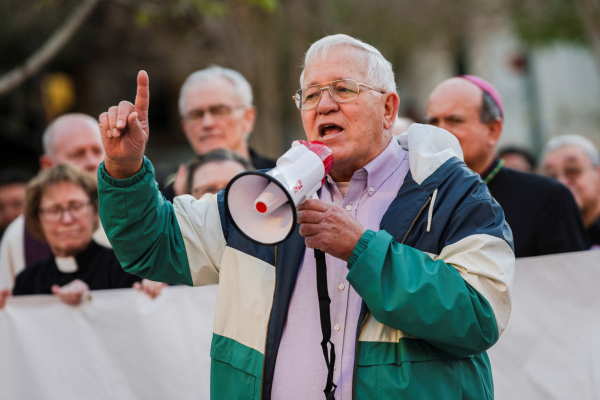“We’re not the bad guys, we’re just the guys trying to get home!” This line, spoken by Jake Gyllenhaal’s character, Danny Sharp, in the trailer for the movie Ambulance (April 8) does more than just relate the plot of director Michael Bay’s next action thriller: it also gives viewers hope that the movie will tell a relatable — if extremely heightened — story about the tough choices everyday Angelenos must make in order to survive in one of the United States’ wealthiest cities.
Deep in debt, Danny and his brother, Will Sharp (Yahya Abdul-Mateen II), attempt to rob a bank. The heist goes sideways, and the Sharps are forced to make their escape in an ambulance transporting a Los Angeles police officer who had been shot. Whether by design or serendipity, they commandeer an ambulance with an onboard paramedic, Cam Thompson (Eiza González), who is then charged with keeping the wounded officer, Zach (Jackson White), alive. The brothers may rob banks and take hostages, but they’d never stoop so low to be “cop killers.”
The trailer also highlights Garret Dillahunt as police captain Monroe. Captain Monroe finds himself in the unenviable position of maintaining the safety of an officer who has sustained life-threatening injuries and is being held hostage in an ambulance. Captain Monroe is hesitant to escalate the situation by simply running the ambulance off the road or shooting the Sharp brothers because doing so would surely spell the end for the “brother cop” on board. Regardless of the danger doing so might bring to the city or the hostage paramedic, Monroe believes this brother cop must be protected at all costs. As these scenes suggest, Ambulance is a story about people being forced into morally compromising positions. But above all else, it is a perfect example of “copaganda.”
Copaganda refers to any piece of media that portrays police as a necessary social institution. While this can include viral videos of police chatting with neighborhood kids or doing lip-sync battles, the most pervasive examples of copaganda are found in pop culture.
The goals of copaganda go far beyond the standardization of police in TV shows and movies. As Color of Change president Rashad Robinson writes in the organization’s Normalizing Injustice report from 2020, the scripted crime genre of television and film “influences the public to grant even more authority to police than they already have: to break the rules, to violate our rights, to cage the beast of crime as they would have us believe it is—racial overtones and all.” By presenting the police as a “thin blue line” protecting decent people from criminals, Robinson explains, copaganda “normalizes injustice.” So baked into the public consciousness is copaganda that it feels like a fundamental part of genre storytelling. Pointing to police television shows like Adam-12, sociologist Alex S. Vitale writes in The End of the Policing that it “is a liberal fantasy that the police exist to protect us from bad guys.”
Vitale’s usage of the word “fantasy” hints at the idea that copaganda, like any other form of pop culture, is an act of imagination that can have material consequences on our society. Copaganda tends to imagine that the world is inherently dangerous because criminals are everywhere. Our only protection is provided through the work of virtuous, if sometimes flawed, cops.
But to imagine the world as inherently dangerous is to imagine people who break the law as being less than human. Portraying them as just “criminals” instead of people in an unequal society obscures the social forces influencing them. As Robinson puts it in the foreword to Normalizing Injustice, copaganda continues to “miseducate the public about crime, race and the system itself” in ways that “undermine reform, demonize people of color and serve to legitimize debunked policies, discredited arguments, corrupt decision makers and (what should be) indefensible actions.”
Robinson’s word “demonize” should raise alarms for Christian viewers. As the charged theological language indicates, Christians have a responsibility to critique copaganda precisely because it accuses and diminishes oppressed peoples, casting them as criminals.
Those ideas run contrary to the teachings of Christ, who acknowledged the plight of the poor and the oppressed and demanded justice from leaders. When Christians accept the world as presented through the lens of copaganda, we enact what theologian Willie James Jennings calls a “diseased social imagination.” Whereas the Christian imagination invites us to look for ways to affirm the dignity of the oppressed and call for justice, copaganda demands that the “goods” — i.e., property, especially commercial spaces and the ability of consumers to spend money on them — must be protected, and the “bad” must be punished through the righteous work of the police.
In The Executed God, theologian Mark Lewis Taylor reminds readers that the early church consisted of the arrested and executed: Jesus, John the Baptist, Peter, Paul and more. “Early followers of Jesus were pitched against empire, often fell out of safe positions in the system, or were disloyal to it.” In other words, Christianity came into being as a criminal phenomenon; thus, Christ’s followers should feel an affinity with criminals.
What does that mean for modern U.S. Christians, who are immersed in copaganda? I don’t think that it means we should boycott copaganda by “voting with our dollars” and turning off pro-cop TV shows or refusing to buy tickets for cop movies. Experts are often skeptical about the effectiveness of consumer activism, and the intense media saturation of copaganda makes this difficult.
Instead of opting out altogether, we should seek to strengthen our Christian imagination by engaging with copaganda from the perspective of a renewed mind (Romans 12:2). We must watch with a critical eye and holy imagination; an imagination that remembers God is revealed not through a cop, but through a criminal.
To demonstrate how copaganda competes with the Christian imagination, consider an example from a 2021 episode of the long-running procedural drama, Law & Order: Special Victims Unit. “Post-Graduate Psychopath” follows detective Amanda Rollins (Kelli Giddish) as she and captain Olivia Benson (Mariska Hargitay) pursue 18-year-old serial killer, Mesner (Ethan Cutkosky). After failing to save several victims, Rollins finds Henry holding his younger sister hostage at gunpoint.
The episode’s climax engages in an exciting trope, as Henry drags his hostage into a house of mirrors at an abandoned funhouse, monologuing the entire time. But where most of these stories end with the hero cop shooting the killer as soon as they get a clear shot, Rollins does something different: She sits on the floor and talks with Henry.
“If we go out together,” she explains, “I can protect you.” When Henry asks why she would do that, the heretofore tense musical score softens and the camera holds on Rollins, who recalls the first time she met him, eight years ago. “Post-Graduate Psychopath” is the sequel to the 2013 SVU episode “Born Psychopath,” in which Rollins and her partner investigated a series of violent acts performed by then 10-year-old Mesner. Now, Mesner is no longer a child psychopath, but a hardened criminal.
“I was worried about you, even now,” she explains as the camera slowly focuses on her resolute but compassionate face. “I don’t want you to die.” Rollins and Henry leave together unharmed. The police have saved the day.
For some, the resolution of the scene is detective storytelling at its best. Not only does it give viewers a tense stand-off, but it shows an alternative to the violence normally associated with policing. But the episode’s narrative serves to reinforce the basic copaganda message that cops are the “good guys” and criminals or the mentally ill are the “bad guys.”
Some of the clearest counter-narratives to this logic can be found in scripture — especially the gospels. Christ understood his own ministry to be in alignment with the prophetic message of proclaiming release to the captives, bringing good news to the oppressed, and liberating prisoners (Isaiah 61; Luke 4:18-19). Christ even liberated a “notorious prisoner” by the name of Jesus Barabbas (Matthew 27).
Barabbas was likely a freedom fighter in the eyes of the occupied Jews but his anti-Roman actions made him a terrorist in the eyes of the empire. In Mark 15:7, Barabbas is labeled an “insurrectionist” and held as a prisoner because he had committed murder, possibly killing a Roman soldier. Roman propaganda and our modern copaganda lead us to simply label Barabbas as one of the “bad guys.” As is the case with all empires, the biblical narrative notes how Pontius Pilate tried to appease the occupied Jews by releasing a prisoner who opposed Roman rule. Pilate offers the crowd a choice between Barabbas and Jesus. The crowd asks that Barabbas be freed and that Jesus take his place.
The focus of this story is either on the depravity of Barabbas or the misguided desire of the crowd — a perspective that promotes antisemitic tropes. The actual point of emphasis should be that Jesus takes the place of someone who the empire labels as a “bad guy.” As the Messiah, Jesus came to restore the dignity of all of God’s children, regardless of how our legal systems attempt to classify people.
This story invites Christians to imagine that God even wants the “bad guys” to be liberated. What if this story isn’t about a dichotomy between a “bad guy” in Barabbas and a “good guy” in Jesus, but a system that creates these dichotomies to begin with? Copaganda is still promoting this system and these dichotomies, but Christians can imagine an alternative.
Got something to say about what you're reading? We value your feedback!







